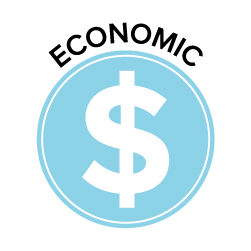
♻️ Sustainability
Policy
The purpose of the district’s sustainability policy is to embrace the principles and practices of sustainability to insure that Rockford Park District assets will remain and be preserved for future generations.
The Rockford Park District, since its inception in 1909, has been a leader in providing parks and recreation opportunities and facilities. The District has 177 parks & facilities, 4,896 acres of land, 82 playgrounds maintained by RPD staff, 1,500 acres of natural areas, 216 improved athletic fields, and 18 canoe and boat access points. The Park District is the steward of these public assets.
Why does Sustainability Matter?
Triple Bottom Line
The “Triple Bottom Line” is a common theme for decision-making in a sustainable society. The Triple Bottom Line refers to the considerations of economic sustainability, environmental sustainability and social equity aspects of a particular decision.
Economic Impact
Rockford Park District is a responsible steward of tax dollars and fee revenue. Rockford Park District operates facilities that have a direct economic benefit to the region's economic sustainability.
Environmental Impact
Rockford Park District protects the environment and is committed to the preservation of natural systems. Rockford Park District educates youth about the importance of environmental sustainability. Existing facilities are retrofitted to be more efficient, and new facilities are constructed in ways to conserve resources where feasible.
Social Impact
Rockford Park District employs hundreds of people from teens to retirees, and brings the diverse Rockford community together through the many recreational opportunities offered. Rockford Park District is a selling point for community partners in retaining and attracting residents.
Recycling / Waste Production (reduction of waste, garbage production)
Decrease the amount of waste produced by the Rockford Park District
Maximize composting of green waste & food waste
Develop programs for waste organic materials
Reduce the use of disposable products
Energy (renewable, efficiency, transportation efficiency, water use)
Improve energy efficiencies in parks and in daily administrative practices
Replace and renovate obsolete energy or resources in efficient infrastructures
Implement the use of “green standards” - solar, wind, hydro, and geo-thermal resources into renovations and design plans
Reduce the consumption of materials and resources
Reduce the amount of fleet and facility emissions
Implement practices that conserve water
Purchasing (reduce amounts purchased, purchase sustainable products, local sourcing, product lifecycle)
Increase the purchase of recycled materials
When possible recycle and reuse current materials
Increase the purchase of items which minimize negative environmental impacts
Maximize the purchase of products with longevity
Where possible purchase from local vendors or producers of products
Open Space / Natural Areas (protect, restore, water quality)
Implement practices and systems that protect water quality and reduce storm water runoff
Enhance, restore and protect existing natural resources
Ensure compatible park and recreation uses adjacent to natural resources
Environmental Health & Toxin Reduction (chemical use, pesticides, air quality, solvents, plastics)
Promote the use of environmentally friendly cleaning products
Reduce the use of pesticides and other toxic materials
Whenever possible purchase products with the health and safety of the employees, patrons and environment in mind
Education (internal and external awareness, sign)
Provide training for staff and the community to work in a sustainable manner
Provide incentives for staff who work in a sustainable manner
Promote awareness of sustainability and natural resource protection
Hold workshops and trainings, provide resources and promote awareness of sustainable practices
Development (upgrade equipment and facilities, LEED Building, retrofits)
Implement the use of “green standards” - solar, wind, hydro, and geo-thermal resources into renovations and design plans
Ensure sustainable development of property
Encourage pedestrian and bicycle transportation to and through sites
Awards/Certifications
Aldeen, Sandy Hollow and Sinnissippi golf courses have received Certification from the The Audubon Cooperative Sanctuary Program for Golf, an award winning education and certification program that helps golf courses protect our environment and preserve the natural heritage of the game of golf.
2014 Engineering Excellence Award – Special Achievement for the Eclipse Lagoon Restoration Project from American Council of Engineering Companies of Illinois (ACEC-IL)
2013 Leadership by Example award winner at Winnebago County Energy Expo (Nicholas Conservatory & Gardens)
Excellence in Landscape Silver Award in the Commercial Construction category for the Eclipse Lagoon Restoration Project at Sinnissippi Riverfront winner from Illinois Landscape Contractors Association
The Outstanding Corporate Friend of the Environment Award presented by Keep Northern Illinois Beautiful
Winnebago County Green Business Award – RPD, Large Organization (twice)
IAPD/IPRA Best of the Best Award, Best Green Practices, Nicholas Conservatory, first runner up
"Community Sustainability Award" from Keep Northern Illinois Beautiful (Nicholas Conservatory & Gardens)
Sustainable Sites Initiative (SITES) for Loves Park Playground
IAPD/IPRA Outstanding Facility & Parks Award, Birds of Prey Exhibit
NRPA Green School Certification. Three graduates from 2013 inaugural class- Tim Bragg, Dan Erwin, Nathan Hill. Jackie Minnihan completed first year of two-year program
Garrett Jones- Leadership in Energy & Environmental Design (LEED) Green Associate
IAPD Best of the Best Award, Best Green Practices, Rockford Park District



















